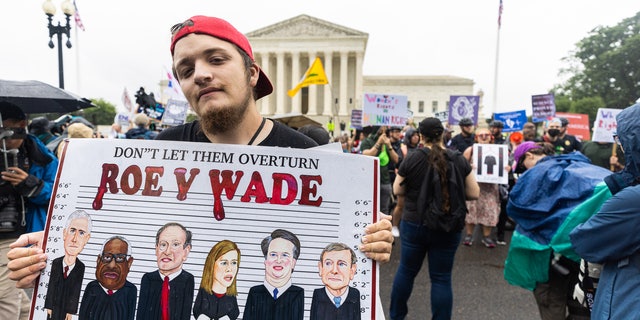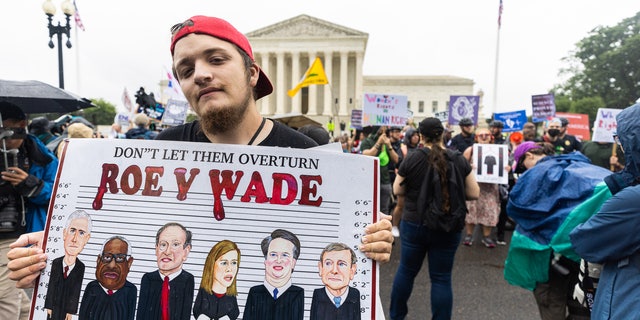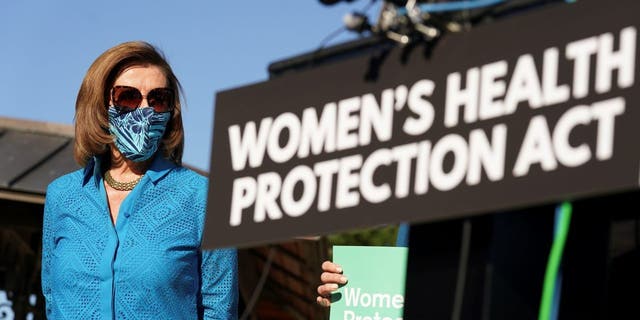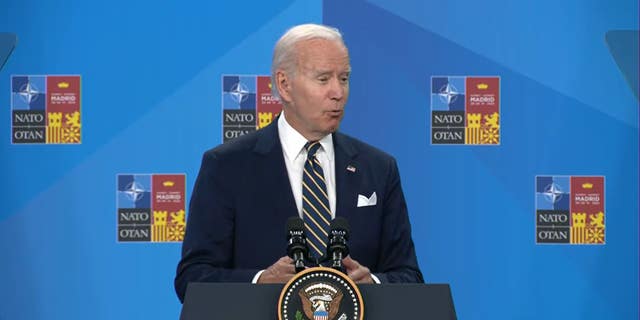
NEWYou can now listen to Fox News articles!
In the first elections since the Supreme Court’s consequential ruling overturning Roe v. Wade, Democratic participation in the primaries in Illinois, New York and elsewhere Tuesday was lower than previous midterm cycles — and pollsters say that’s a bad sign for Democrats’ chances in November.
Compared to the 2018 midterms, where Democrats swept the House in a blue wave reaction to former President Donald Trump, the 2022 primary season has seen anemic participation from Democratic voters. That didn’t change after the Supreme Court’s decision on Dobbs v. Jackson Women’s Health Organization Friday, which reversed 50 years of precedent recognizing a constitutional right to an abortion and returned abortion regulation to the states.
“What I have seen in every state with one exception is that Democratic turnout either is noticeably down or flat, while Republican turnout in almost every state is noticeably up relative to 2018,” GOP polling consultant John Couvillon told Fox News Digital.
Democrats have been fundraising and telling voters that abortion — and many other rights — are at stake if the party doesn’t gain at least two seats in the Senate and retain its slim majority in the House, and left-wing analysts say abortion will be a major factor against Republicans in November. But the message hasn’t struck a major chord with primary voters.

Outside the Supreme Court Thursday morning ahead of possible announcement on Dobbs v. Jackson (Joshua Comins/Fox News)
In Illinois, over 1.3 million people voted in the Democratic gubernatorial primary in the 2018 midterm cycle. On Tuesday, 821,200 voted in the gubernatorial Democratic primaries, with an estimated 94% of the ballots counted. The difference reflects nearly 40% decline in turnout.
“When you’re talking about the impact of Roe v. Wade on voting, I did not see much if any impact on the June 28 vote,” Couvillon told Fox News Digital. “That was the same story in early May, when the draft Dobbs decision leaked.” Couvillon said he didn’t see more Democrats appearing in early voting in Georgia and North Carolina, but Republicans still were motivated to participate.”
The low-energy turnout reflects a pattern seen throughout this midterm cycle.
“First, throughout the primary season we’ve seen Republicans more engaged and energized than democrats — that enthusiasm gap is also reflected in the polling data,” Tom Bevan, co-founder of RealClearPolitics, told Fox News Digital.
Other factors certainly play into the level of turnout in statewide races. As Bevan points out, “2018 was a big year for Dems, they were furious about Trump, and they had a competitive primary here to take on [former Illinois governor] Bruce Rauner. This year is the opposite: [incumbent Gov. JB] Pritzker did not face any real opposition, which may also account for the lower turnout.”
But across the nation, the primary participation shows that political winds are in the Republicans’ favor this year, according to Couvillon. “In the states that have had primaries so far the partisan vote in 2018 in those states was 53% Democratic. This year it’s 53% Republican, so you have this swing,” Couvillon said.

House Speaker Nancy Pelosi (D-CA) listens during a news conference about the House vote on H.R. 3755, the “Women’s Health Protection Act” September 24, 2021. (REUTERS/Kevin Lamarque)
New York’s Democratic primary for governor saw a similar drop in turnout. In 2018, more than 1.5 million voters cast ballots in the Democratic gubernatorial primary, and on Tuesday the number of voters dropped to 863,238, though that number reflects only an estimated 95% of the counted ballots.
“We’ve seen this from the beginning of the primary season, that for Republicans, turnout has been up for them, they’ve been more engaged. That’s reflected in all the polling data and we’ve seen it on the ground in all these races.”
The GOP is motivated to take back the House and Senate, while “Democrats are depressed, quite frankly,” Bevan said.
If the overturn of Roe were to be a key issue in the midterms, it likely would have driven some turnout in the primaries, and that hasn’t happened this week, nor is it apparent that abortion has been major issue since the leak of the draft opinion in Dobbs.

President Joe Biden holds a press conference. (Fox News )
“Every time the Democrats thought that they had an issue that would be able to change the dynamics of the election, it hasn’t happened,” Bevan said. “People who think that this decision, that Roe is going to fundamentally alter the dynamics of the election — as long as we remain in a situation with 8% inflation and $6 a gallon gas, I think they’re kidding themselves.”
Part of the reason Roe wasn’t a major primary issue is because the two parties are mostly ossified in their stances — Democratic candidates will likely support abortion access, Republicans will likely oppose it. However, even in races where abortion could have made a difference, it didn’t appear to. Texas Rep. Henry Cuellar, the lone pro-life Democrat in the House, narrowly survived his primary race against rival Jessica Cisneros, who attacked her opponent for his position on abortion.
CLICK HERE TO GET THE FOX NEWS APP
Though polling suggests abortion is more important to Americans than in years past, it still is far from the top concern for voters.
“Things like Roe v. Wade are more of the issues of the moment, as opposed to something much more wide-ranging, which impacts every American family. Abortion is a very niche kind of issue that might matter in Democratic strongholds, but in a lot of the country it doesn’t,” Couvillon said.








